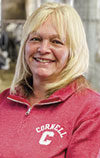There were representatives from the supply chain, such as food processors, veterinarians, agribusiness professionals and retailers. There were those who work in school food service, hunger relief, university extension, government and public policy. And there were people who interact directly with consumers, including registered dietitians, physicians, fitness professionals and culinary experts.
I was there, too.
In all, 25 of these “Nourish Dialogue Dinners” featured about 250 stakeholders and other dairy farmers from around the country in 2019. The concept was to provide a comfortable, mealtime setting where we could freely talk about sustainable food systems. Our goal was to find ways to help shift the narrative from what we regularly hear – the perception that the food system is broken and needs transformative change to ensure human and planetary health. Many global authoritative reports are telling us how the food system should and could be fixed, so that inspired the checkoff to gather those who actually contribute to and work daily in the food system to talk about just that.
Sustainable food systems are based on four components:
-
Environment – Impact on land, water and energy use
-
Social – Food security, cultural identity and norms, cultural and religious influences on food choices, inclusive food distribution channels
-
Health – Quality, diversity, accessibility, affordability, taste, enjoyment and safety of the food supply; dietary patterns, nutrient adequacy, disease risk, population health
- Economic – Food prices, food and social justice, fair wages for producers and laborers, profitability
Closing the gap
As farmers, we very much understand our place in the food system. Yet many of those at these dinners do not know what goes on at a farm. In fact, many were no different from today’s consumers, who are a couple of generations or more removed from our farms.
So it was critical our voices were part of these dinner discussions. However, I admit I was a little nervous when I was asked to participate. With misinformation about dairy out there, I wasn’t sure what I would encounter. What I found, however, was a group of people who were genuinely interested in how our farm functions. It wasn’t so much about milk’s nutrition. They understood the “nine essential nutrients” aspect of milk.
Instead, they asked about cow care and sustainability. Do we treat our animals well? What are we doing to protect the planet and make sure we are good neighbors?
It’s no different than what we hear from the general consumer. These dinners allowed attendees to get answers from the best source possible: dairy farmers.
They were interested to learn our farm is family owned-and-operated, putting to rest the “factory farm” myth put forth by special interest groups. I explained how my husband, Jeff, and I have six kids but only one son works at the farm. We milk 100 cows, but if more of our children opted to return to the farm, we’d have to grow our herd for everyone to earn a living. This made sense to them.
One of the best moments occurred when the chef came out to speak about the meal that was prepared for us. He gave a nod to the farmers who made the dinner possible. With me in attendance, it might have been the first time they could put a face behind the true source of their food.
Next steps
When the series of dinners concluded, three call-to-action steps were identified for future collaboration opportunities:
-
Set the record straight: Develop creative approaches to improve food literacy so the next generation is empowered to make heathier, more sustainable food choices.
-
Embrace comprehensive sustainability: Ensure that the food system sustainability domains – environment, health, economic and social – are addressed in the development and implementation of all food and nutrition programs and practices.
- Be solution-oriented: Partner with other stakeholders to create solutions, and raise awareness about new, innovative ways stakeholders are supporting sustainable food systems.
I left the dinner feeling very good about the purpose of this checkoff-led effort. Opportunities to engage with such a cross-section of leaders are important, as they can carry our story and message forward to others. They need to hear the farmer perspective and, conversely, we need to hear theirs and learn from them.
All of us understand one thing: We’re in this together as we navigate our way toward a future in which, by 2050, more than 10 billion people worldwide will need access to nutritious food which was produced in a way that is good for the planet.
The Nourish Dialogue Dinners were an important step for all stakeholders to come together. They created a unique opportunity for us to share dairy’s benefits to people, communities and the planet. We formed important networking opportunities and new connections that continue today.
I’m glad farmers had a seat at the table to help ensure our place in a sustainable food system is understood. ![]()
To view a full report on the Nourish Dialogue Dinners or to learn more about your national dairy checkoff, visit U.S. Dairy or send a request to join our Dairy Checkoff Farmer Group on Facebook. To reach us directly, send an email to Talk to the checkoff.
Your Dairy Checkoff in Action – The following update is provided by Dairy Management Inc. (DMI), which manages the national dairy checkoff program on behalf of America’s dairy farmers and dairy importers. DMI is the domestic and international planning and management organization responsible for increasing sales of and demand for dairy products and ingredients.
-
Audrey Donahoe
- New York Dairy Farmer
- Chair, National Dairy Council




